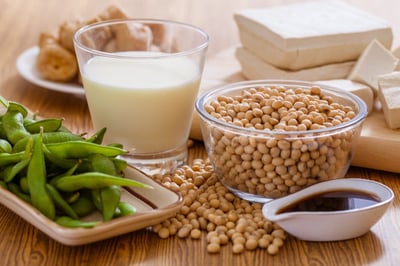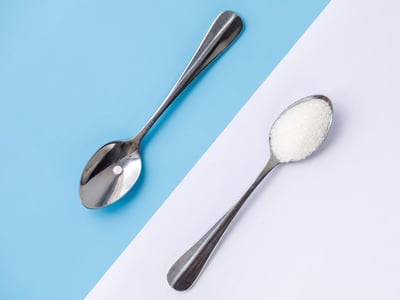FORCE's eXamining the Relevance of Articles for You (XRAY) program looks behind the headlines of cancer news to help you understand what the research means for you.
XRAY is a reliable source of hereditary cancer research-related news and information.
Learn more about the XRAY program
In portal: Breast Cancer, Categories Nutrition & Exercise
Relevance: Medium


Strength of Science: Medium


Research Timeline: Animal Studies


Study : Weight may affect breast cancer risk in women with an inherited BRCA mutation
Relevance: Medium


Strength of Science: Medium


Research Timeline: Animal Studies


Most relevant for: People with an inherited mutation in BRCA1 or BRCA2 concerned about their breast cancer risk
A study that looked at normal breast cells from women with an inherited BRCA mutation found more DNA damage among women who were overweight (based on a measurement known as body mass index) than those who were not overweight. The results suggest that maintaining a lower weight may reduce breast cancer among this high-risk population. (Posted 3/30/23)
Este artículo está disponible en español.
Read More
Study : Increasing soy in your diet may lower your cancer risk
Most relevant for: People interested in reducing cancer risk
This study looked at a link between a diet rich in soy and cancer risk. With the addition of more recent literature, this study suggests that soy lowers the risk of cancer in the general population. (Posted 2/24/23)
Este artículo está disponible en español.
Read More
Relevance: Medium-High


Strength of Science: High


Research Timeline: Post Approval


Guideline : Guidelines on exercise, diet, and weight during cancer treatment
Relevance: Medium-High


Strength of Science: High


Research Timeline: Post Approval


Most relevant for: People currently undergoing treatment for cancer
Most professional guidelines on exercise, diet and weight management have focused on the health of the general population and cancer survivors. The American Society of Clinical Oncology (ASCO) has now published evidence-based recommendations for exercise, diet and weight specifically for people who are in active treatment for cancer. (Posted 11/29/22) Este artículo está disponible en español.
Read More
Relevance: Medium-High


Strength of Science: High


Research Timeline: Post Approval


Study : Physical activity may decrease fatigue associated with cancer treatment
Relevance: Medium-High


Strength of Science: High


Research Timeline: Post Approval


Most relevant for: Cancer patients who are experiencing fatigue related to cancer or its treatment.
Many cancer survivors experience fatigue during and after they complete treatment. This study looked at the effect of home-based physical activity on fatigue in cancer survivors. It also looked at whether frequent counseling encouraged people to start and continue their exercise routines. (Posted 8/1/22). Este artículo está disponible en español.
Read More
Relevance: Medium


Strength of Science: Medium


Research Timeline: Post Approval


Study : Do artificial sweeteners increase the risk of cancer?
Relevance: Medium


Strength of Science: Medium


Research Timeline: Post Approval


Most relevant for: People who consume artificial sweeteners
A large study of adults in France suggests that artificial sweeteners may increase the risk of certain cancers. (posted 6/21/2022). Este artículo está disponible en español.
Read More
Relevance: Medium


Strength of Science: Medium-High


Research Timeline: Post Approval


Study : Increasing melatonin use raises concerns
Relevance: Medium


Strength of Science: Medium-High


Research Timeline: Post Approval


Most relevant for: people who take or consider taking melatonin to help with sleep.
Adult use of melatonin as a sleep aid has increased even though its benefits and risks are not well understood. This study looked at trends in melatonin use over the last 19 years. (Posted 4/14/2022)
Este artículo está disponible en español.
Read More
Relevance: High


Strength of Science: Medium-High


Research Timeline: Post Approval


Study : Physical activity may prevent chemotherapy-related cognitive decline in women with breast cancer
Relevance: High


Strength of Science: Medium-High


Research Timeline: Post Approval


Most relevant for: People concerned about the impact of chemotherapy
Many people experience chemo brain or chemo fog (cognitive effects) during and after chemotherapy. Researchers looked at the impact of physical activity on chemotherapy-related decline in memory, attention and information processing in women with breast cancer. This study shows that more physical activity before and during chemotherapy is linked to better information processing after chemotherapy. (Posted 1/6/22)
Este artículo está disponible en español.
Read More
Relevance: High


Strength of Science: Medium-High


Research Timeline: Post Approval


Study : Drinking coffee or tea may improve survival after breast cancer
Relevance: High


Strength of Science: Medium-High


Research Timeline: Post Approval


Most relevant for: Women with breast cancer who drink coffee or tea.
In a study of 8,900 women with stage 1, 2 or 3 breast cancer, those who drank coffee survived longer after a breast cancer diagnosis than those who did not drink coffee. Both coffee and tea were linked to improved survival from any cause. Several factors were linked to greater coffee or tea consumption, so this finding must be taken with some caution. However, breast cancer survivors who are regular coffee or tea drinkers may find this research reassuring. (posted 8/31/21)
Este artículo está disponible en español.
Read More
Relevance: Medium-High


Strength of Science: Medium-High


Research Timeline: Post Approval


Study : Body Mass Index (BMI) may affect how well aspirin use protects against colorectal and ovarian cancer
Relevance: Medium-High


Strength of Science: Medium-High


Research Timeline: Post Approval


Most relevant for: People concerned about their risk of colorectal or ovarian cancer.
This study looked at the impact of daily aspirin use on the risk for many types of cancers and whether this effect can be modified by risk factors such as obesity, smoking, physical inactivity or a family history of cancer. Daily aspirin use:
- lowered the risk for colorectal cancer, but this effect was lost as Body Mass Index (BMI) increased.
- lowered the risk of ovarian cancer risk among obese women.
- offered little or no protection against breast, endometrial or advanced prostate cancer.
(posted 3/19/21)
Este artículo está disponible en español.
Read More
Relevance: Medium-Low


Strength of Science: Medium-Low


Research Timeline: Human Research


Study : Dairy milk may slightly raise breast cancer risk
Relevance: Medium-Low


Strength of Science: Medium-Low


Research Timeline: Human Research


Most relevant for: Women who consume dairy or soy
Debate continues about whether consuming soy or dairy products increases breast cancer risk. This study looked at a large number of women and found no link between soy and breast cancer risk. The study did find that postmenopausal women who drank dairy milk have a small increase in breast cancer risk. (09/04/20)
Read More